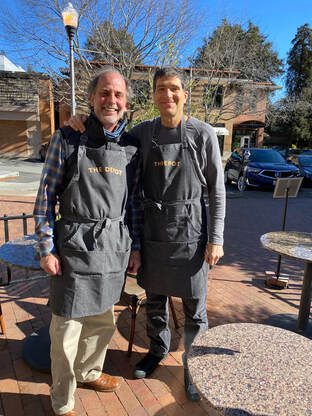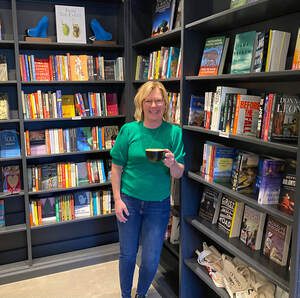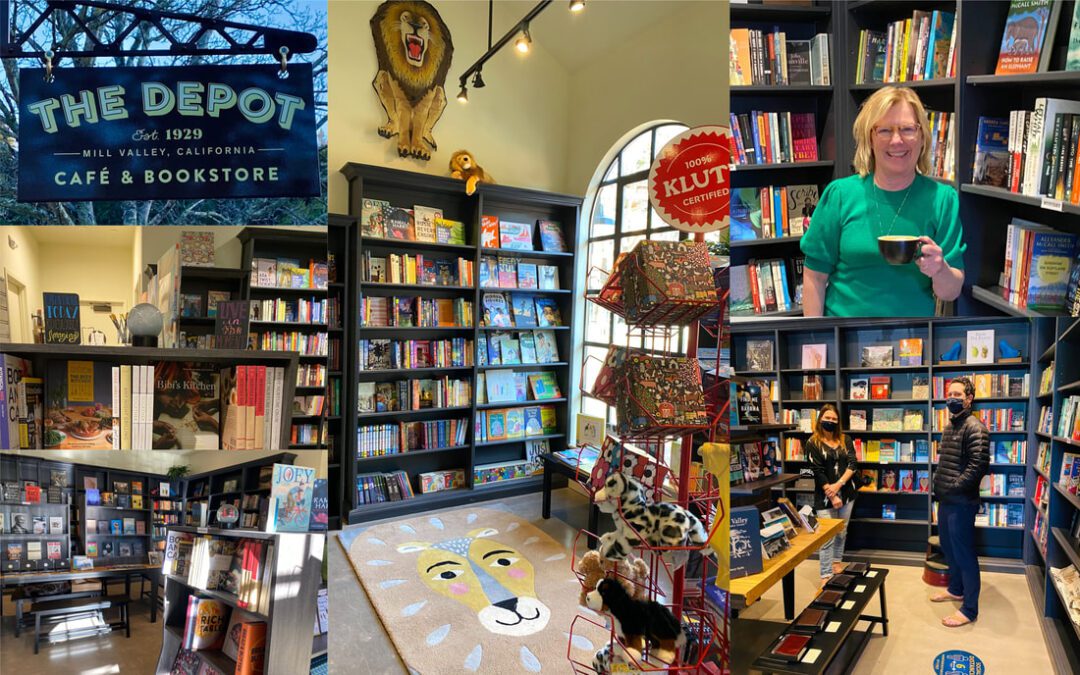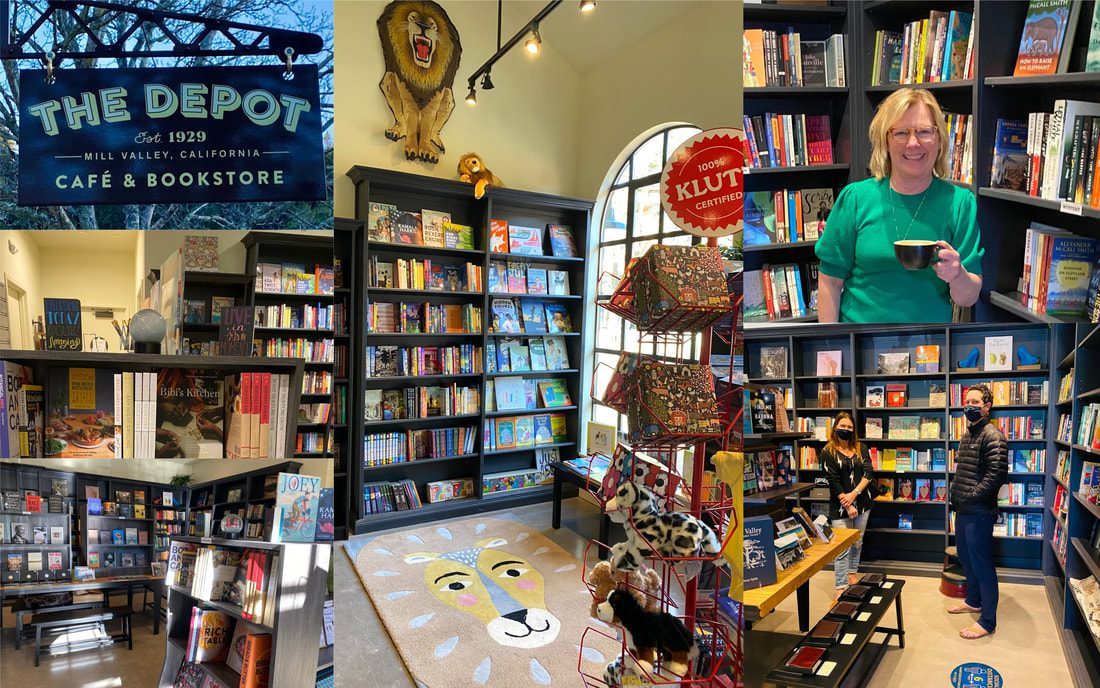At the time, then-Councilmember Jessica Jackson made it clear that the bookstore must remain a vital component to the business that resides with the proverbial heart of downtown Mill Valley.
“It’s important that we maintain the current size of the bookstore,” Jackson said. “It’s symbolic. In 1974, the council voted to convert the bus station into a bookstore and cafe and since then it’s really operated as that. It is really a reflection of our values that we value literacy and that we value coming together around books.”
With the reopening of the Depot Cafe & Bookstore last month, specifically with book shelves spanning an array of categories and a fantastic children’s section – Mill Valley, home to one of the best public libraries in the country, as well as oodles of Little Free Libraries all over town – once again has a viable, community-minded bookstore in the heart of its downtown.
A Well-Rounded Team
 Depot Cafe & Bookstore managing partners Paul Lazzareschi and Mark Martini on their opening day on Jan. 25.
Depot Cafe & Bookstore managing partners Paul Lazzareschi and Mark Martini on their opening day on Jan. 25.
Two of those residents were Dan and Katy Leese, who have been regular customers at Lazzareschi’s Vasco restaurant across the street for years. “He’s just such a great person,” Katy Leese says, noting that he’d made their Lucinda and Millie wine Vasco’s house wine for a while. “He’s so friendly and makes sure everyone is comfortable.” Having sold their wine business in 2018, the couple was thinking about their next chapter, and decided to invest and become partners in the Depot.
Additional investors also joined the effort, including Mark Martini, Richard Patterson and Pam Carlomagno, Ridge Sampson and Andreas Weinberger. Longtime Marin bakery owner Gary Rulli was already on board. “Everyone seems to add some individual talent to the mix,” Leese says, noting that Patterson rebuilt and beautified many of the bookstore’s old book shelves and chairs and Carlomagno helps with the bookkeeping. Mill Valley resident Mark Winn designed the Depot Cafe + Bookstore’s new logo, branding and signage.
During that time, Leese started thinking about how to reinvigorate the bookstore and make it something that met the community’s needs and honored the Depot’s literary history Jackson had celebrated. In doing so, she had plenty of family literary history to draw upon.
Leese majored in English in college, her father worked at Reader’s Digest, and many of her siblings are writers, including her sister Samantha Hunt, an author who recently penned an opinion piece in the New York Times about what it means to be her teenage daughters in the aftermath of the election of Vice President Kamala Harris.
“I’ve always loved bookstores,” Leese says. “At one point, I was going to do a children’s bookstore and that didn’t happen, and I’m so glad to be doing this now.”
Leese decided to take on operations of the bookstore, joined by children’s book expert Leanne Townsend and fiction/non-fiction specialist Marianne.
 Katy Leese in the Depot Bookstore.
Katy Leese in the Depot Bookstore.
“Fifty percent of the people that came by thought that the bookstore was not coming back,” she says. “Everyone has been so happy to see it and they are so thankful that there is a bookstore back in town. And I promise that I can have just as many books as were in the original bookstore.”
Leese says she and her team are focused on how to manage the complexities of carrying newspapers and magazines, But she says they’re committed to responding nimbly to special orders and requests. “We are special ordering books a few times a week, and we get them in for pickup within 3-4 days,” she says, noting that customers don’t have to pay for special orders in advance.
“We are very open to what the community wants to see in the shop,” Leese says, noting that they’re constantly filling up a spiral notebook with suggestions from customers. “We are really here for the community. That’s the whole concept for the Depot Cafe & Bookstore.”
A Nod to a Rich History
“We love the Depot and it’s such a great Mill Valley icon and so meaningful to so many people – it’s the heart of Mill Valley,” Leese says of a building that began as a train station, built by the Northwestern Pacific Railroad in 1928. It served as the terminal for trains that ran between Mill Valley and the Sausalito ferry. Shut down in the 1940s, it morphed into a bus depot, used first by Greyhound and later by Golden Gate Transit.
In his 2019 tome Edges: Mountains, Forests and Creeks, acclaimed Mill Valley landscape architect Eldon Beck wrote that the Depot Plaza “functions as a meadow, an ecotonal clearing in a forest” where “parents, grandparents and others retreat to the edges to watch the performers, “mostly kids, adventure into the plaza.” The dominant feature of that “meadow” is a building that, as Beck notes, is in the midst of “its third life.”
That third life is steeped in the building’s history. “We have this former train station building that sits at the end of this historic rail line,” Leese says, noting Martini’s work with the Mill Valley Historical Society to place historic photos on metal to connect the dots.
“We are absolutely celebrating that wonderful history of this place,” Leese says.



